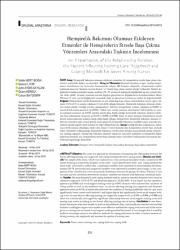| dc.contributor.author | Boğa, Selda Mert | |
| dc.contributor.author | İlter, Gonca | |
| dc.contributor.author | Sayılan, Aylin Aydın | |
| dc.contributor.author | Kersu, Özlem | |
| dc.contributor.author | Baydemir, Canan | |
| dc.date.accessioned | 2021-12-12T16:48:59Z | |
| dc.date.available | 2021-12-12T16:48:59Z | |
| dc.date.issued | 2019 | |
| dc.identifier.issn | 2536-4391 | |
| dc.identifier.uri | https://doi.org/10.5336/healthsci.2019-65513 | |
| dc.identifier.uri | https://app.trdizin.gov.tr/makale/TXpNM056QTVPUT09 | |
| dc.identifier.uri | https://hdl.handle.net/20.500.11857/1647 | |
| dc.description.abstract | Amaç: Hemşirelik bakımını olumsuz etkileyen etmenler ile hemşirelerin stresle başa çıkma yöntemleri arasındaki ilişkiyi incelemektir. Gereç ve Yöntemler: Kesitsel-tanımlayıcı tipte yapılan araştırmanın örneklemini bir üniversite hastanesinde çalışan 184 hemşire oluşturdu. Araştırmada verileritoplamak amacıyla “hemşire tanıtım formu” ve “stresle başa çıkma tarzları ölçeği” kullanıldı. Sürekli değişkenler ortalama±standart sapma, medyan (25.-75. persentil), kategorik değişkenler ise sayı (yüzde) olarak ifade edildi. Gruplar arasında normal dağılım göstermeyen değişkenlerin karşılaştırılması MannWhitney-U testi, sayısal değişkenler arasındaki ilişki ise Spearman korelasyon analizi ile değerlendirildi.Bulgular: Hemşirelerin stresli durumlarda en çok kullandığı başa çıkma yöntemlerinin boyun eğici yaklaşım (11,51±3,7) ve çaresiz yaklaşım (13,22±4,65) olduğu bulundu. Hemşirelik bakımını olumsuz etkileyen etmen olarak “istediği serviste çalışamamayı” belirten hemşirelerin iyimser yaklaşım (p=0,020) vesosyal destek arama puanının (p=0,047), “bakım için yeterli zamanın olmamasını” belirtenlerin ise çaresiz yaklaşım puanının (p=0,019) anlamlı olarak daha düşük olduğu; hemşirelik bakımını olumsuz etkileyen bazı etmenlerde (sırasıyla, p=0,010; p=0,004; p=0,008) lisans ve üzeri mezunu hemşirelerin sosyaldestek arama puanının anlamlı olarak daha düşük olduğu; hemşirelerin hemşirelik bakımını olumsuz etkileyen etmenlere göre sosyal destek arama puanı ile hemşirelik bakımına verdikleri puan arasında istatistiksel olarak negatif yönde anlamlı bir ilişki olduğu bulundu. Sonuç: İstediği klinikte çalışamayan, bakımiçin yeterli zamanı olmadığını ifade eden, lisans ve üzeri mezunu olan hemşirelerin stresle başa çıkmadaetkin yöntemleri kullanmadığı, hemşirelik bakımına verilen puan arttıkça sosyal destek arama yönteminin azaldığı saptandı. Hemşirelik bakımını olumsuz etkileyen etmenleri azaltmak ve hemşirelik bakımkalitesini artırmak için, hemşirelerin stresle başa çıkmada etkin yöntemleri kullanmaları konusunda desteklenmesi gerektiği düşünüldü. | en_US |
| dc.description.abstract | Objective: The study was planned for the purpose of examining the relationship between the factors affecting nursing care negatively and coping strategies for stress among nurses. Material and Methods: The sample of the study, which was conducted as a cross-sectional descriptive study, consisted of 184 nurses working in a university hospital. In the study, “nurse identification form” and “coping methods for stress scale” were used to collect data. Continuous variables were expressed as mean±standard deviation, median (25-75. percentile) and categorical variables were expressed as numbers (percentage). In the comparison of the variables that were not normally distributed between the groups, the Mann Whitney-U test was used and the correlation between the numeric variables was assessed with Spearman correlation analysis. Results: The most frequently used coping methods used by nurses in stressful situations were found as submissive approach (11.51±3.77) and desperate approach (13.22±4.65). It was found out that optimistic approach (p=0.020) and social support seeking scores (p=0.047) of nurses who indicated the condition of ‘being unable to work in the preferred clinic’ as a factor affecting nursing care negatively and desperate approach scores (p=0.019) of nurses who indicated the condition of ‘having insufficient time for care’ were significantly lower; nurses with bachelor’s and higher degree had significantly lower social support seeking scores in some factors affecting nursing care negatively (respectively, p=0.010; p=0.004; p=0.008) and there was a statistically and negatively significant relationship between social support seeking scores and nursing care scores according to the factors affecting nursing care of nurses. Conclusion: It was determined that nurses who were unable to work in the preferred clinic, had insufficient time for care and had bachelor’s and higher degree were unable to use effective methods for coping with stress and as the scores given to nursing care increased, social support seeking method decreased. It was thought that it would be useful to encourage nurses to use effective methods for coping with stress in order to reduce stressors affecting nursing care negatively and increase the quality of nursing care. | en_US |
| dc.language.iso | tur | en_US |
| dc.relation.ispartof | Türkiye Klinikleri Sağlık Bilimleri Dergisi | en_US |
| dc.identifier.doi | 10.5336/healthsci.2019-65513 | |
| dc.rights | info:eu-repo/semantics/openAccess | en_US |
| dc.subject | Eğitim | en_US |
| dc.subject | Eğitim Araştırmaları | en_US |
| dc.subject | Hemşirelik | en_US |
| dc.subject | Psikoloji | en_US |
| dc.title | Hemşirelik Bakımını Olumsuz Etkileyen Etmenler İle Hemşirelerin Stresle Başa Çıkma Yöntemleri Arasındaki İlişkinin İncelenmesi | en_US |
| dc.title.alternative | An Examination of the Relationship between the Factors Affecting Nursing Care Negatively and Coping Methods for Stress among Nurses | en_US |
| dc.type | article | |
| dc.department | Fakülteler, Sağlık Bilimleri Fakültesi, Hemşirelik Bölümü | |
| dc.identifier.volume | 4 | en_US |
| dc.identifier.startpage | 251 | en_US |
| dc.identifier.issue | 3 | en_US |
| dc.identifier.endpage | 260 | en_US |
| dc.relation.publicationcategory | Makale - Ulusal Hakemli Dergi - Kurum Öğretim Elemanı | en_US |



















